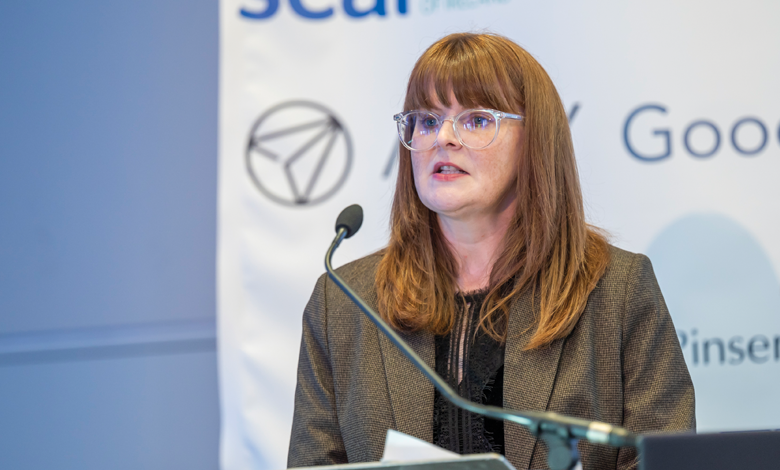
Bridging the renewable divide: Lessons from Ireland’s coal-free leap
15th October 2025
Powering Ireland’s energy revolution BnM’s Brendan Kelly
15th October 2025Minister Caoimhe Archibald MLA: Driving the energy transition

The North’s Minister for the Economy Caoimhe Archibald MLA, outlines her priorities for delivering the energy transition, highlighting investment in skills, infrastructure, and renewables as key to achieving a just and prosperous net zero future.
Minister Archibald describes the transformation of Northern Ireland’s energy system as both “a moral necessity and a legal requirement under the Climate Change Act”, but one that also presents “an opportunity for a more prosperous and a fairer economy”.
The Minister acknowledges the shared challenges facing both jurisdictions on the island, but emphasises that the transition can unlock economic growth if delivered collaboratively.
“When [the strategy] was launched back in 2021, we were still recovering from the Covid pandemic. In 2022 Russia invaded Ukraine, and energy costs spiralled, triggering a cost-of-living and a cost of doing business crisis that has been hugely difficult for households and businesses, but it underlines the importance of Ireland becoming self-sufficient in renewable energy,” Archibald says.
Northern Ireland is now approaching the halfway point of its 10-year Energy Strategy: Path to Net Zero Energy. This long-term framework, the Minister says, aims to create “a more secure, affordable, and sustainable energy system”, while also helping to deliver her four economic priorities: creating more good jobs, addressing regional imbalance, increasing productivity, and decarbonisation.
Action plan for 2025
As part of the strategy, the Department for the Economy (DfE) publishes annual action plans. “My plan for 2025 identifies 19 cross-government actions which will move us towards delivery of our 2030 targets, which includes the commitment to deliver at least 80 per cent of our electricity consumption from a diverse mix of renewable sources,” she explains.
“By working together across this island, with communities, businesses, and government, we can ensure that this transition delivers a secure, affordable, and decarbonised energy system, protecting consumers today and building prosperity for tomorrow.”
Caoimhe Archibald MLA, Minister for the Economy
Among those actions was the publication of the Green Skills Action Plan earlier in 2025. “This is crucial, because if we are to deliver the transition and realise the economic opportunities that it presents, then we need to equip our people with the right skills,” the Minister says. The plan was co-designed with industry, and Archibald’s officials engaged with counterparts in Dublin to explore how training initiatives can maximise all-island opportunities.
Grid and interconnection
Archibald is clear that deployment of renewables “must be matched by investment in infrastructure, and work is ongoing to ensure our grid and energy systems accommodate greater levels of clean electricity”.
Delivery of the North-South Interconnector, she says, will be “critical in delivering all-island security of supply with efficient operation of the network and more renewable generation on the island”.
Building on the Utility Regulator’s approval of NIE Networks’ record RP7 Business Plan, Archibald asserts that investment in transmission and distribution will underpin the system’s capacity to integrate renewables at scale. Addressing high levels of dispatch down also remains a priority, with the Department working with SONI and the Utility Regulator to ensure that more renewable electricity can reach consumers at lower cost.
Smart meters and consumer empowerment
Later in 2025, DfE is scheduled to announce a smart meters design plan. Archibald says: “The rollout of smart meters will empower consumers to take control of their own energy usage while enabling a data-driven electricity grid ready to support the delivery of greater levels of renewables.”
Smart meters will also support real-time system balancing, reducing the need for costly grid reinforcements and lowering carbon emissions, while giving households greater transparency over consumption and costs.
The consultation for the plan closed in January 2025, and is scheduled for final publication later in 2025.
Another priority for 2025 is to reduce reliance on fossil fuels in home heating. “I will also publish the design for future low carbon heat and energy efficiency support in residential buildings. This will support the uptake of low carbon heating, moving homes away from fossil fuel reliance, and provide a stimulus for jobs creation and skills,” the Minister says.
The Department for the Economy has directed investment into insulation programmes for low-income households and is exploring scaled-up retrofitting initiatives in collaboration with partners. The Minister says that upcoming consultations on new domestic energy efficiency support will inform the design of long-term schemes.
Offshore energy and biomethane
Northern Ireland’s coastline offers a wealth of renewable potential. “I will confirm arrangements for connection of offshore renewable energy to the grid. This is a key step in ensuring we can utilise the abundance of renewable resources available on our coast as we move towards a net zero future,” Archibald explains.
Alongside offshore wind, her department is working to support a sustainable biomethane sector. “Another key action this year will be support for the sustainability of biomethane used in our gas network to complement our large agricultural sector,” she says.
Whole-system approach
Archibald says that collaboration across government, industry, and communities is central to delivery. DfE is developing a hydrogen policy framework and continues to advance offshore renewable planning through the Offshore Renewable Energy Action Plan. Meanwhile, action on energy efficiency, green skills, and grid expansion reflects her “whole-system” approach.
“It is also important to say that while I am responsible for energy, this is very much a collective effort across the Executive,” she says, citing the complementary work of the Minister of Agriculture, Environment and Rural Affairs Andrew Muir MLA in bringing forward the North’s draft Climate Action Plan.
Concluding, Archibald says: “By working together across this island, with communities, businesses, and government, we can ensure that this transition delivers a secure, affordable, and decarbonised energy system, protecting consumers today and building prosperity for tomorrow.”

